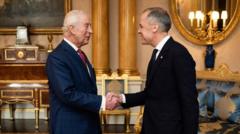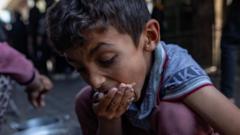Momodou Taal, a student at Cornell University, voluntarily departs the US after having his visa revoked due to protest activities against Israel, amidst rising tensions and targeted actions against international students.
International Student Exits the US Amid Controversial Visa Revocation

International Student Exits the US Amid Controversial Visa Revocation
A Cornell University graduate student, targeted by the Trump administration for his pro-Palestinian protests, opts to leave rather than face deportation.
A Cornell University graduate student, targeted by the Trump administration for his pro-Palestinian protests, has chosen to depart the United States rather than face deportation. Momodou Taal, a dual citizen of the UK and The Gambia, announced his decision to leave the country on social media after his student visa was revoked following on-campus demonstrations during the Israel-Gaza conflict.
Taal, who previously sought legal measures to prevent his deportation, stated he made the choice to "leave free and with my head held high," after a judge denied his request for a delay. He cited a loss of faith in the legal system to ensure his safety or protect his rights to free expression. "I have lost faith I could walk the streets without being abducted," he remarked.
The Trump administration is reported to be intensifying scrutiny on international students involved in protests against Israel, classifying these cases as "self-deportations." According to Secretary of State Marco Rubio, over 300 students have had their visas revoked as part of this crackdown. Recent actions are part of Trump’s broader commitment to combat antisemitism, which was formalized in an executive order earlier this year.
Critics of these deportations argue that they represent a serious infringement on free speech rights. Another international student, Ranjani Srinivasan from India, also chose to leave the US to clear her name after similar actions were taken against her. She expressed a desire to return to Columbia University to continue her studies.
The repercussions of these actions raise questions about the balance between national security and the rights of students to voice their opinions on contentious issues, such as the ongoing conflict in Israel and Gaza.


















